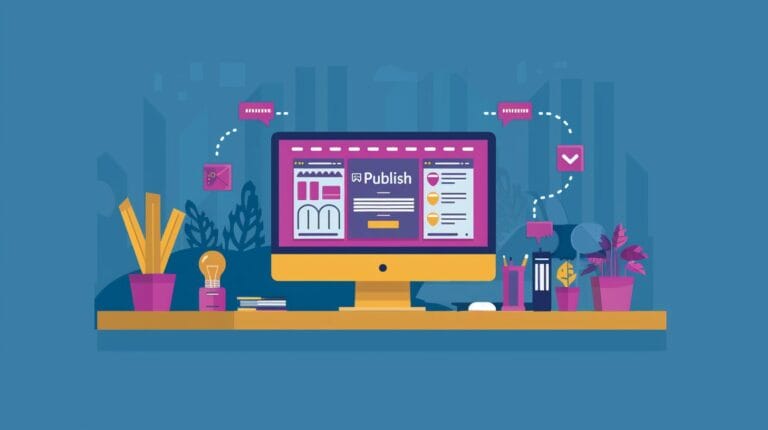What Do I Need to Become a Web Developer: Understanding the Basics of Web Development

We are thrilled to welcome you to the exciting world of web development! While it may seem overwhelming at first, there’s no need to feel swamped! Our objective in this blog is to guide you exhaustively through the fundamental aspects of web development, ensuring that you fully understand all the essentials for this captivating adventure.
With a friendly attitude, we’ll look at the tools and skills needed to become a successful web developer. So get ready to learn and let’s dive into the basics of web development!
Definition of Web Development

Web development is an umbrella term for the work involved in developing a website for the Internet. It includes web design, web content development, client-side/server-side scripting, network security configuration, and e-commerce development.
Web developers use HTML, CSS and JavaScript to create websites. They may also use server side languages such as PHP, ASP. NET and Ruby on Rails to create dynamic web pages that interact with the user, control access to certain parts of the website or provide special functionality.
Web developers are also responsible for creating backup files of the website’s data and code in case something goes wrong with the site. Besides technical skills, web developers must have strong problem solving and communication skills in order to collaborate with other team members.
Benefits of Becoming a Web Developer
Becoming a web developer can be a rewarding career choice. With the right skills and qualifications, you can make a good living while working in an exciting and dynamic field. Web developers have the unique opportunity to create websites, applications, and other technology solutions that benefit businesses and individuals alike.
Web developers often enjoy creative freedom, allowing them to customize their projects according to the clients’ needs. This flexibility allows for more innovative solutions and makes for a more stimulating work environment.
There is always demand for experienced web developers because of the ever-develop nature of online technology, making it an excellent long-term career option with many opportunities for growth.
What Skills and Knowledge Do I Need to Become a Web Developer?

Technical Skills and Knowledge
Web developers must have a firm foundation in technical skills and knowledge. Here are some key areas to focus on:
- HTML and CSS: are essential technical skills for web developers. HTML is used to create the structure of a website, while CSS defines the styling and design elements. Having a solid understanding of these languages allows web developers to create functional and visually appealing web pages.
- JavaScript: is a scripting language that is used to create interactive websites and web applications. With JavaScript, developers can create interactive elements such as menus, buttons, and other user interface elements. JavaScript also enables developers to create logic to allow for more complex user interactions and the creation of applications.
- Server-side Programming Languages: Server-side programming languages are used to create the backend of web applications. Examples of server-side programming languages include PHP, Java, Ruby, and Python. Knowing how to use these languages is essential for web developers, as it allows them to create more efficient and secure web applications.
- Database Management: You’ll need to be familiar with database management systems and how to work with them to store and retrieve data for websites and applications.
- Mobile Application Development: If you want to develop mobile apps, you’ll need to have knowledge of mobile-specific programming languages and frameworks such as Swift for iOS or Java for Android
- Responsive Web Design: With the increasing use of mobile devices, it’s important to design websites that are responsive and can adapt to different screen sizes.
- Version Control: Using version control systems like Git can help you keep track of changes to your code and collaborate with other developers.
- Design and User Interface (UI/UX): A strong understanding of design principles and user experience (UX) is important for creating appealing and user-friendly websites.
Soft Skills
- Problem-solving: As a web developer, you’ll often face complex problems that require creative and analytical thinking to solve. It’s important to have strong problem-solving skills and be able to think of finding solutions.
- Communication: Web developers often work with clients and team members to bring ideas to life. It’s important to communicate your ideas and understand the needs of others.
- Teamwork: Web development is often a team effort, so it’s important to work well with others and be a productive team member.
- Time Management: Web developers often have multiple projects and deadlines to juggle. It’s important to manage your time and prioritize tasks to ensure that everything is completed on time.
Educational Paths to Becoming a Web Developer

- Getting a degree in Computer Science or Web Development: These programs often cover a range of subjects, including algorithms, data structures, and web development languages like HTML, CSS, and JavaScript. A degree can provide a solid foundation for a career in web development.
- Getting a Certificate in Web Development: Certificate programs in web development are shorter and more focused than degree programs. Universities, online learning platforms, or coding bootcamps may offer them.
- Taking Online Courses: There are many online resources available for learning web development, including courses on platforms like Coursera and Udemy. These courses can be a flexible and cost-effective way to learn web development skills.
Can I Learn Angular JS from Your Video Tutorial If I’m a Beginner in Web Development?
Yes, you can definitely learn Angular JS from our beginner-friendly video tutorial. Our comprehensive angular js tutorial is designed to cater to individuals with no prior web development experience. We walk you through the basics, providing clear explanations and demonstrations. Start your journey today and master Angular JS at your own pace with our extensive tutorial.
Are Solid State Drives Essential for Web Development?
When it comes to web development, the basics of 256gb ssd speed can play a crucial role. Solid State Drives (SSDs) offer faster data access, which aids in the swift loading of websites and applications. The improved speeds enhance overall user experience, reduce latency, and ensure smooth functionality, making SSDs an essential component for efficient web development.
What Level of Experience Do I Need?
If you are considering getting into web development, it is important to understand the level of experience you need in order to become a successful developer. There are three levels of experience: entry level, mid-level, and senior level.
- Entry Level: At an entry level, you don’t need to have any specific degree or formal education in order to become a developer, but it is beneficial to have some knowledge of coding and web development. You can also gain experience by working on personal projects and building your portfolio.
- Mid-Level: At the mid-level, formal education or training in computer science or web development may be beneficial. Familiarity with the latest technologies and frameworks can also be helpful for success in this role.
- Senior Level: Senior-level positions in web development typically require a strong foundation in computer science or web development, as well as a wide range of coding, development, and design skills. Practical experience is also important for success at this level.
Overall, the level of experience and education you need depends on the type of developer job you are looking for. If you are just starting out, don’t forget to invest in learning and building your skill set. With the right amount of dedication, you can become a successful developer, no matter what level of experience you have.
Different Web Developers

There are several types of web developers, each with their own unique skills and responsibilities. Here are some of the most common types:
- Front-end Developers: focus on the design and user experience of a website. They use languages like HTML, CSS, and JavaScript to build the interface that users interact with. If you want to learn how to become a front-end developer, some steps you might consider include getting a degree in web development or a related field, learning the necessary coding languages, and building a portfolio of projects to show your skills.
- Back-end Developers: focus on the server-side of web development, building and maintaining the systems that power a website. They use languages like PHP, Python, and Ruby to build and optimize databases, servers, and other infrastructure. To become a back-end developer, you may obtain a degree in a related field and learning one or more server-side languages. Gaining experience working with databases and servers can also be beneficial.
- Full-stack Developers: have a broad range of skills that allow them to work on both the front-end and back-end of a website. They are proficient in a variety of coding languages and technologies, and can develop and maintain all aspects of a website. If you want to become a full-stack developer, you’ll need a firm foundation in both front-end and back-end development, as well as the ability to learn and adapt to new technologies as needed.
Regardless of which type of web developer you want to be, it’s important to have a passion for technology and a willingness to learn and improve your skills. With the right combination of education, experience, and dedication, you can succeed in the exciting field of web development.
How to Get Started
- Set Goals: Before you learn, it’s important to have a clear idea of what you want to achieve. Do you want to become a front-end developer, a back-end developer, or a full-stack developer? do you want to work for a company, or be a freelancer? do you want to specialize in a particular type of technology or platform? By setting clear goals, you can focus your learning and stay motivated as you progress.
- Choose Your Path: There are many ways to learn web development, so it’s important to choose the path that’s right for you. Some options might include getting a degree in computer science or web development, taking online courses, attending a coding boot camp, or learning on your own through self-study and practice. Consider your learning style, budget, and availability when making your decision.
- Start Practicing: Once you have a simple plan in place, it’s time to learn and practicing your skills. This might involve working through online tutorials and exercises, building simple websites or apps, or collaborating with others on open-source projects. As you progress, be sure to seek feedback and guidance from more experienced developers, as this can help you improve and grow as a professional.
Conclusion:
In conclusion, becoming a web developer is a rewarding and exciting career choice that offers a wide range of opportunities and a competitive salary. With the right combination of education, experience, and dedication, you can develop the skills and knowledge you need to succeed in the field. While it may take some time and effort to become a web developer, the rewards are well worth it.
Whether you’re interested in front-end development, back-end development, or full-stack development, there are many paths you can take to get started. By setting clear goals, choosing the right learning path, and practicing your skills, you can achieve your dream of a career in web development. With hard work and determination, you can become a skilled and in-demand web developer, able to take on a variety of exciting and challenging projects.
So, if you are interested in web development and want to learn about building web applications, a degree in computer science or a related field can be a great place to start. By gaining a firm foundation in computer science and web development technologies, you can set yourself up for a successful and fulfilling career as a web developer.






